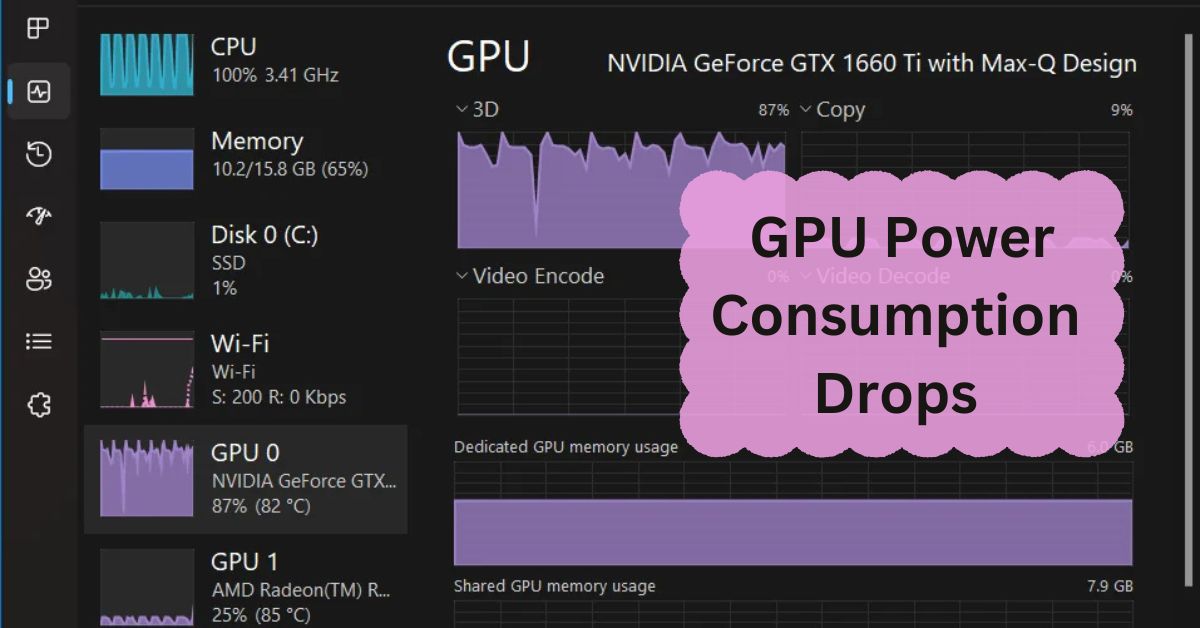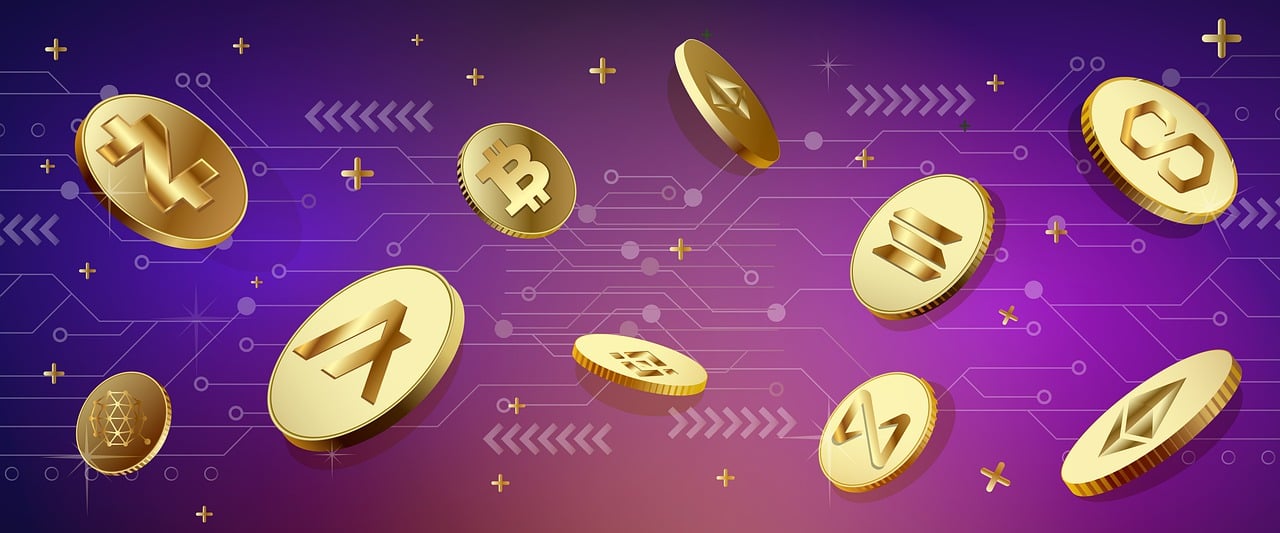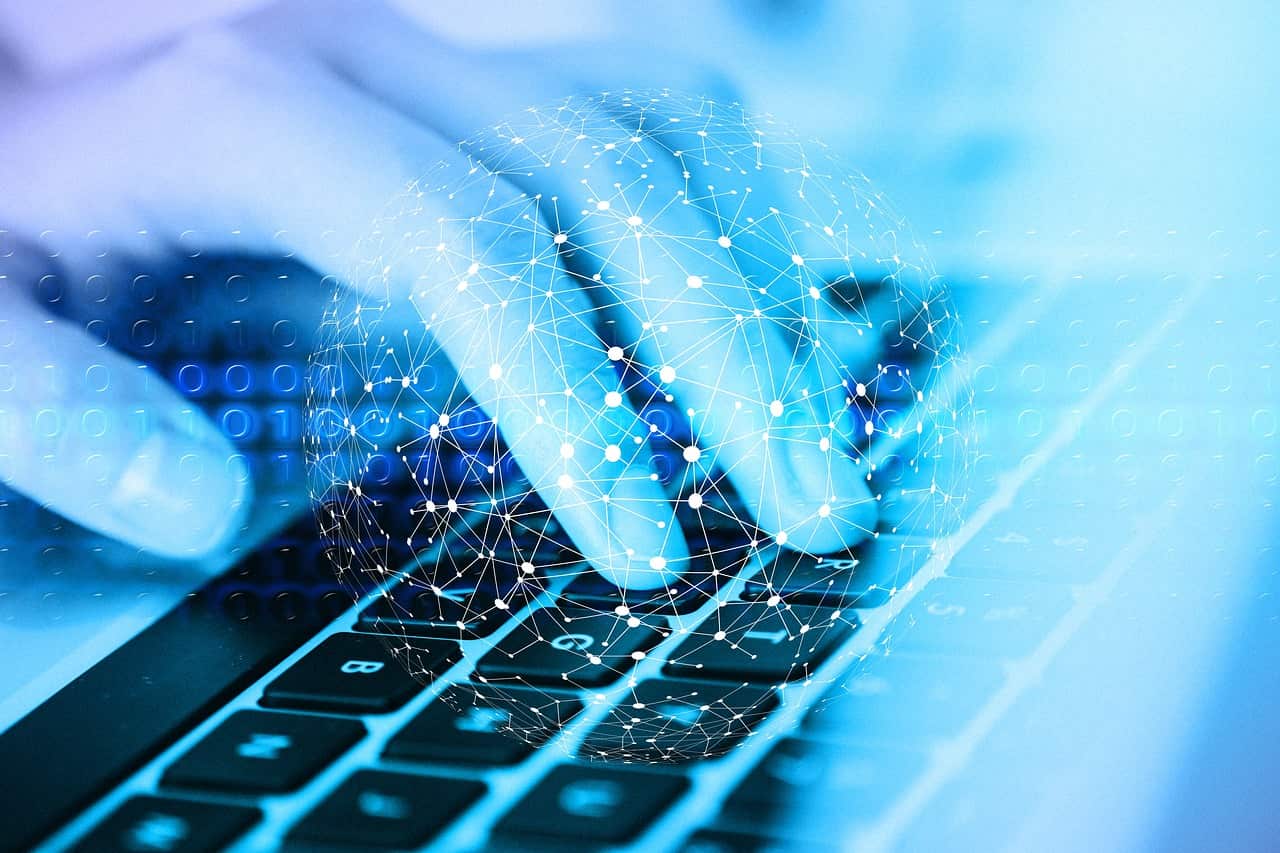Graphics cards, or GPUs, are power-hungry components in a computer, especially when gaming or performing heavy tasks. But what happens when GPU power consumption drops? Understanding this can help manage performance, energy bills, and system health.
GPU power consumption drops mean that graphics cards use less electricity, which makes them more efficient. This is important for saving energy, reducing heat, and lowering electricity bills. It also helps improve performance and is better for the environment, especially for gaming and crypto mining.
In this article, we will discuss “GPU Power Consumption Drops”.
Table of Contents
What Is GPU Power Consumption?
GPU power consumption refers to the amount of electricity your graphics card uses during operation. This can vary based on workload, settings, and GPU design.
Efficient power usage can ensure your GPU runs smoothly without drawing excessive power from your system.
Why Does GPU Power Consumption Drop?
There are several reasons why GPU power consumption might drop. One common cause is when the GPU is idle or under a light load, it automatically reduces power usage to save energy.
Modern GPUs have built-in power-saving features like dynamic voltage adjustment, which lower power use when full power isn’t needed.
Why GPU Power Consumption matter?
High power consumption leads to increased energy bills and contributes to environmental degradation due to higher electricity usage.
Furthermore, excessive power consumption can cause GPUs to overheat, affecting performance and longevity. Keeping GPU power consumption in check is not just about saving money; it also reduces environmental impact and keeps systems running efficiently.
Importance of Power Efficiency in GPUs:
Power efficiency is crucial not just for performance but also for keeping energy costs down. A GPU that consumes less power produces less heat, which extends its lifespan and reduces cooling needs.
Additionally, energy-efficient GPUs contribute to environmental sustainability by using fewer resources.
Technologies That Help Reduce GPU Power Consumption:
Modern GPUs use several technologies to reduce power usage. For example, NVIDIA’s GPU Boost and AMD’s PowerTune dynamically adjust clock speeds and voltage to balance performance with power efficiency.
These technologies ensure that the GPU only uses as much power as necessary for the current task.
Effects of Power Consumption on GPU Performance:
There’s always a balance between power usage and performance. When GPUs lower their power consumption, performance can sometimes take a slight dip.
However, with the right settings, you can maintain a good balance between performance and efficiency without compromising on gaming or other demanding tasks.
How to Monitor GPU Power Consumption:
Monitoring your GPU’s power consumption is essential to ensure everything runs smoothly.
Tools like GPU-Z, MSI Afterburner, and software utilities from GPU manufacturers can help track power usage in real time. This information helps you make necessary adjustments and prevent overheating.
Reasons to Monitor GPU Power Consumption:
Keeping an eye on GPU power levels helps maintain system stability. High power consumption can lead to overheating, which might cause your GPU to throttle or shut down to prevent damage.
By monitoring power usage, you can avoid potential issues and ensure your system runs efficiently.
How to Optimize GPU Power Consumption:
There are various ways to optimize GPU power usage without sacrificing performance.
Adjusting in-game settings, reducing unnecessary background tasks, and using power-efficient modes can significantly lower power consumption. Many GPUs also allow users to customize power plans depending on their workload.
GPU Throttling and Power Consumption:
When a GPU overheats, it can throttle and reduce its clock speed to cool down. Throttling directly impacts performance and is usually a result of high power consumption. ‘
To avoid this, ensure proper ventilation and consider using power-saving features when gaming or working on heavy tasks.
Power Consumption in Different GPU Models:
Power consumption varies widely among different GPU models. High-end cards like the NVIDIA RTX 4090 consume significantly more power than budget options like the GTX 1650. It’s essential to understand your GPU’s power requirements to optimize its efficiency.
Impact of Overclocking on Power Consumption:
Overclocking increases power consumption as it pushes the GPU beyond its factory settings. While this can improve performance, it also generates more heat and requires more electricity. Careful adjustments are necessary to balance performance gains with increased power usage.
Does GPU power consumption drop gaming?
Yes, GPU power can drop during gaming due to temperature controls, software settings, or power limits. This can lower performance and cause lower frame rates. Monitoring software can help find the reason for power drops.
High GPU usage low power draw?
If your GPU has high usage but low power draw, it might be working under power-saving modes or limited by software settings. This can cause lower performance in games and lower frame rates.
GPU usage drops while gaming?
GPU usage may drop due to system limitations, background tasks, or power management settings. This can cause games to lag or lose frames. Checking the system for bottlenecks can help fix the issue.
GPU power consumption drops, resulting in low frames.
When GPU power drops, the performance often lowers, causing lower frame rates in games. This might be because of power-saving settings or overheating, which limits the GPU’s full performance.
FPS dropping everytime GPU watts drop?
If your GPU wattage drops, it can reduce its performance, causing FPS to drop. This can happen if the system is limiting power or the GPU is overheating. Fixing cooling or adjusting power settings may help.
Why does my GPU wattage keep dropping?
Your GPU wattage may drop due to power management, overheating, or power limits set by the system. This affects performance, especially during gaming. Improving cooling or adjusting software settings can solve this.
Why is my GPU power usage randomly dropping?
Random GPU power drops can be caused by power-saving settings, overheating, or background tasks using CPU resources. Monitoring tools can help track these changes and adjust settings for smoother performance.
Why Is My GPU Power Consumption Dropping In-Game?
In-game GPU power drops can happen due to power-saving modes, high temperatures, or software settings. These drops can lower your gaming performance, causing stuttering or frame drops.
Why does my GPU voltage keep changing?
GPU voltage may change depending on workload and temperature to manage performance and avoid overheating. This is usually controlled by the system’s power management to balance performance and stability.
How much watts should my GPU be getting?
The wattage your GPU needs depends on the model. Most modern gaming GPUs need 200-300 watts or more. Check your GPU specifications for the exact power requirement to ensure it’s getting enough power.
GPU usage randomly drops resulting into a massive FPS drop?
If GPU usage randomly drops, this can lead to sudden FPS drops during gaming. This may happen due to power settings, CPU bottlenecks, or background tasks affecting performance.
Why is my GPU using so little power?
Your GPU may use less power due to power-saving settings, low-demand tasks, or thermal throttling. For gaming, check your system settings to ensure the GPU is not restricted from using its full power.
Why is GPU usage dropping?
GPU usage may drop due to system bottlenecks, background programs, or power-saving settings. This can result in poor gaming performance or frame drops. Adjusting software settings can help boost usage.
Is it normal for GPU usage to fluctuate?
Yes, GPU usage can fluctuate depending on workload. It may be higher during intense tasks and lower when idle or under low demand. This is common in both gaming and regular tasks.
Does Undervolting GPU reduce wattage?
Yes, undervolting the GPU reduces its power usage by lowering the voltage supplied. This helps control heat and power consumption, but it might slightly lower performance if not balanced properly.
GPU power consumption table 2024?
A GPU power consumption table shows the wattage required by different GPUs during idle, average use, or peak performance. Updated tables for 2024 will list power usage for GPUs like the Nvidia RTX 4000 and AMD RX 7000 series.
Why does my GPU randomly reduce its power consumption?
GPUs reduce power consumption during low-demand tasks like web browsing or idle states to save energy. This is normal and part of the GPU’s power management system to optimize efficiency and minimize heat generation.
Why is my GPU usage dropping randomly?
Random GPU usage drops may occur due to thermal throttling, driver issues, or CPU bottlenecks. Monitor temperatures, update drivers, and ensure your CPU is fast enough to match your GPU’s performance.
Why does my GPU power fluctuate so much?
GPU power fluctuates based on workload. During intense tasks, power usage rises, while lighter tasks lower consumption. Sudden power drops may indicate power supply issues, thermal throttling, or driver problems.
Why is my GPU suddenly not using full power?
Your GPU may not use full power if the workload is light, power-saving modes are enabled, or the GPU is throttling due to overheating. Check settings and temperatures, and update drivers if needed.
GPU power consumption drops gaming?
Power consumption drops during gaming can result from underutilization, thermal throttling, or insufficient power delivery. Ensure your GPU is not overheating and your power supply is adequate for stable performance.
GPU drops to 0 while gaming?
If GPU usage drops to 0% while gaming, it could be caused by driver crashes, overheating, or a game optimization issue. Check GPU temperatures, update drivers, and test with other games.
Why is my GPU using less power?
A GPU uses less power during light workloads, in energy-saving modes, or if thermal throttling occurs. Check your power settings and ensure proper cooling to allow the GPU to perform optimally.
Why is my GPU not taking enough power?
If your GPU isn’t receiving enough power, the power supply unit (PSU) may be insufficient, or power cables might not be connected properly. Verify PSU wattage and cable connections to fix the issue.
FAQs:
Can GPU power consumption affect gaming performance?
Yes, if your GPU consumes too much power and overheats, it can throttle, leading to reduced performance during gaming.
What software is best for monitoring GPU power consumption?
Tools like GPU-Z, MSI Afterburner, and manufacturer-specific utilities are great for tracking GPU power usage.
How much does power consumption vary between idle and load?
A GPU uses significantly less power when idle or under light load compared to heavy gaming or rendering tasks.
Does undervolt a GPU reduce power consumption?
Yes, undervolting can lower the voltage supplied to the GPU, reducing power consumption while maintaining performance.
How does GPU power consumption impact the overall system power draw?
A power-hungry GPU increases your system’s overall power usage, which can lead to higher energy costs and more heat production.
How much power does my GPU use while gaming?
The power your GPU uses depends on the game and the settings. For example, AAA games at high settings can draw anywhere from 150 to 300 watts or more.
Can I lower GPU power consumption without losing performance?
Yes, you can lower power consumption by adjusting settings like resolution and frame rate, using power-saving features, or even undervolting your GPU.
Why do gaming laptops have lower GPU power consumption?
Gaming laptops use more efficient GPUs with technologies like NVIDIA Max-Q or AMD SmartShift, which are optimized for power-saving without sacrificing too much performance.
Is it worth upgrading to a more power-efficient GPU?
If you’re concerned about electricity costs or environmental impact, upgrading to a more power-efficient GPU can be a good investment, especially if your current GPU is older.
How do I know if my GPU is drawing too much power?
You can monitor your GPU’s power consumption using tools like MSI Afterburner or GPU-Z. If your GPU consistently draws more power than expected, it might be time to check for issues or consider upgrading.
Conclusion:
In conclusion, reducing GPU power consumption is important for saving energy, lowering electricity bills, and improving performance. Using power-efficient technologies helps keep GPUs cooler and extends their lifespan. By managing power usage wisely, you can enjoy gaming or other tasks without sacrificing performance while also being environmentally friendly.


